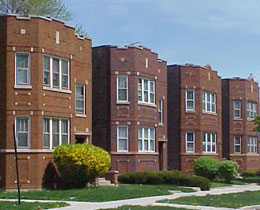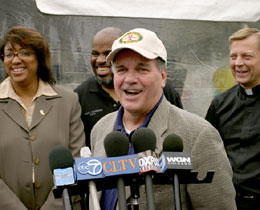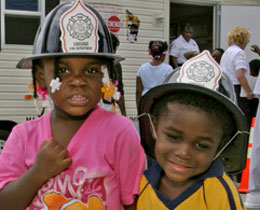Auburn-Gresham renewal off the ground
John McCarron
Published: November 5, 2004
It's hard telling exactly when a neighborhood realizes it is time for collective, corrective action. Sometimes the wake-up is a deadly fire, or a wanton shooting, or an "urban removal" threat from City Hall.

The neighborhood has a variety of well-maintained housing, including these brick two-flats.
Photo: Carlos Nelson
For Auburn Gresham, a quiet, family-kind-of-neighborhood on Chicago's Far South Side, the moment may have been the fall of the golden arches. "Anytime you lose a McDonald's, you know you're in dire straits," said Carlos Nelson, executive director of the Greater Auburn-Gresham Development Corporation (GADC).
He remembers the sinking feeling in the mid-'90s when the fast-food icon closed its restaurant at 79th and Halsted streets. Fed up with street gangs, drug dealing and general neglect, other chains, such as Popeye's and Brown's fried chicken, would pull out as well.
Now, Nelson looks to 79th and Halsted as a source of inspiration. There's a new Osco Drug where the arches once stood, and a new 6th District police station. Across 79th there's a LaSalle Bank—no small achievement in a neighborhood where currency exchanges and payday lenders used to monopolize financial services.

At BJ's Bakery, Mayor Richard M. Daley is flanked by, from left, Ald. Latasha Thomas, Chicago Housing Authority CEO Terry Peterson and Pastor Michael Pfleger of St. Sabina.
Photo: Eric Young Smith
All up and down 79th and Halsted, and increasingly along Racine and Ashland Avenues, there's the unmistakable look of a neighborhood on the move: freshly painted signage, new banners, canvas awnings over lively storefronts.
"We're a strong community, but in the '60s business abandoned us," said Rev. Michael Pfleger, pastor of the Faith Community of St. Sabina, a Catholic parish and neighborhood anchor. "The accepted mentality was that all we get are liquor stores and beauty shops."
Something better
But ordinary people in an ordinary neighborhood demanded—and got—something better. A series of community meetings, some drawing 400 people, were held at St. Sabina, convened by Rev. Pfleger and then-Ald. Terry Peterson (17th).
"We talked about what we wanted for our neighborhood and what we didn't want," recalled Rev. Pfleger. "Safety was an issue, so we started Friday night marches against crime. We'd march right up to the drug houses and the gang leaders and challenge them to give it up. We'd say 'Do you want to get back into school? Do you need a job? Or would you rather deal with the law?' "

Auburn Gresham's NCP director Nicole Jones (left) spreads the word about the neighborhood's resources.
Photo: Eric Young Smith
Their approach to retail developers was similarly straightforward. "We're not asking you to come here and give charity," said Rev. Pfleger. "We want you to make money."
And make money they have, because Auburn Gresham still has plenty of purchasing power. Its residential blocks, after all, never saw the flight blight that hit its commercial streets. "Folks here dug in," Pfleger explained. "They stayed and they continued to live and to care."
This point is key to understanding Auburn Gresham. Yes, it did "change" totally—at least on the surface—between 1960 and 1980, going from 99.7 percent white to 98.4 percent African-American.
But its neat rows of bungalows and two-flats did not go the way of blocks in some nearby neighborhoods. There are no weedy prairies where houses once stood, no surplus of FHA-repossessed board-ups. Eyesores are far outnumbered by front-yard flowerbeds and statuary—just as families earning over $75,000-a-year outnumber those receiving public assistance.
But as the next generation moved up and away, Auburn Gresham developed a kind of urban anemia. Its unpretentious cottages—10 miles distant from the South Loop renaissance, an expressway (Dan Ryan) apart from the black affluence of Chatham and points east—held little allure for young, upwardly mobile families.
The 2000 Census found six out of ten residents were 55 or older. Today, many pensioners are hard-pressed to pay rising property taxes.
"Our seniors are wary of taking on more debt," said Deborah Moore, a GADC board member who directs the local office of Neighborhood Housing Services of Chicago. To help elderly homeowners cope, NHS and GADC collaborate on a repair program that links seniors to low-interest financing and reliable contractors.
Luring young families
Seniors are a secret weapon of Auburn Gresham's revival. "They have the time and determination to get information and to do something with it," Moore said.
The elders also understand Auburn Gresham needs an infusion of young families. Attracting young families is a key challenge for Auburn Gresham.

Attracting young families is a key challenge for Auburn Gresham. Above, children at a back-to-school fair.
Photo: Eric Young Smith
How to win them? The group's still-evolving quality-of-life plan is loaded with ideas. How about a Metra station on the Rock Island commuter line at 79th Street? How about redeveloping the tired housing along Winneconna Parkway, a long-ignored gem that winds for three blocks around an idyllic chain of fishing lagoons? How about a bookshop, a performing arts venue, and more stores to make this a "buppie" magnet?
A key leader is Ald. Latasha Thomas (17th), who replaced Terry Peterson when Mayor Richard M. Daley drafted him to run the CHA. Like Peterson, Thomas has steered millions in public investment to the ward, including an $8 million city ante for SOS Children's Village, a housing campus for foster children and parents at 76th and Parnell Streets.
Auburn Gresham's official NCP one-liner is "Chicago's best-kept secret." But neighborhood veterans have a slyer version: "Make 17 like 19." They see no reason why the 17th Ward cannot, some day, have the snob appeal of the 19th Ward, a.k.a. the swank Beverly neighborhood to the west.
Committed seniors, dynamic leaders, hidden trea-sures. Who's to say Auburn Gresham can't pull it off?
Contact: Nicole Jones, Greater Auburn Gresham Development Corp., 773-483-3696.
Posted in Community Highlights